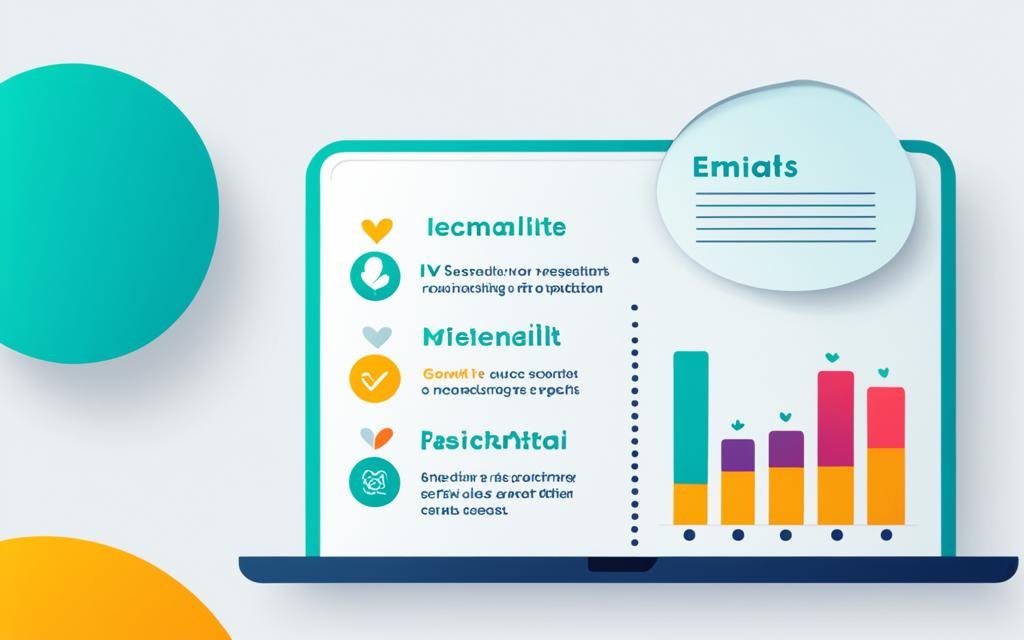Digital marketing is now key for IVF hospitals to grow and reach more people. With more people seeking fertility services, the market is growing fast. By 2030, it’s expected to hit $161.846 million, growing at 13.4% each year from 2015. IVF clinics need strong digital marketing to keep up.

Using digital marketing, IVF hospitals can focus on the right people. This means targeting couples aged 25-45 with good incomes in cities. A good digital marketing plan can help you stand out and draw more patients to your clinic.
To make the most of your marketing, spend your budget wisely and focus on mobile users. Use tools to track your progress and improve your strategies. Keeping up with the latest in digital marketing for IVF hospitals is crucial for success and growth.
Key Takeaways
- The global fertility services market is expected to reach $161.846 million by 2030, with a 13.4% CAGR from 2015.
- Digital marketing is crucial for IVF hospitals to attract patients and stay competitive in the growing fertility industry.
- Targeting specific demographics, such as couples aged 25-45 in urban, middle, and upper-middle-class income groups, can help optimize marketing efforts.
- A comprehensive digital marketing strategy should include SEO, social media engagement, mobile-friendly design, and data-driven decision-making.
- Continuously refining your approach based on analytics and industry trends is key to long-term success in fertility clinic marketing.
The Importance of Digital Marketing for IVF Hospitals
In today’s world, having a strong online presence is key for IVF hospitals. It helps them attract patients and stay ahead in healthcare. Digital marketing offers many strategies and tools to reach potential patients, teach them about treatments, and boost conversions.

Digital marketing lets IVF hospitals target specific groups with messages they’ll like. By knowing what their ideal patients want and need, clinics can make content that speaks to them. This makes it more likely that people will engage and take action.
| Digital Marketing Strategy | Potential Impact |
|---|---|
| Google Search Ads | Increase new patient acquisition by 30% |
| Social Media Marketing | Leverage the shareability of positive IVF outcomes |
| Patient Testimonials | Showcase success stories and influence potential patients |
| Website Optimization | Enhance user experience and site performance |
| Diverse Lead Generation Pathways | Increase website conversions by 25% |
Digital marketing also lets IVF hospitals educate potential patients. Through blogs, videos, and infographics, clinics can share important info on treatments and success rates. This builds trust and helps people make better choices about their fertility journey.
“Digital marketing has changed how we connect with potential patients. By using SEO, social media, and content marketing, we can reach and teach people looking for fertility treatments. This helps them on their path to starting a family.”
Also, digital marketing helps IVF hospitals be seen as leaders in their field. By sharing expert content on different platforms, clinics can boost their reputation and credibility. This can make a big difference in patients’ choices and help IVF hospitals stand out in a crowded market.
Understanding Your Target Audience
To make a strong digital marketing plan for your IVF hospital, knowing your target audience well is key. You need to know who they are and what they like. This helps you make marketing that speaks to them and meets their needs.

Identifying the Demographics of IVF Patients
For IVF patients, there are certain groups to focus on. These include:
- Age: Most IVF patients are between 30 and 45. This is when fertility issues are more common.
- Income: IVF is costly, so patients usually have good incomes or are willing to spend a lot on their fertility care.
- Education: Many IVF patients are well-educated and do a lot of research before picking a clinic.
- Location: Where your target audience lives can affect their access to fertility services and their views on IVF.
Knowing these demographics helps you make marketing that talks directly to your ideal patients.
Analyzing Patient Behavior and Preferences
It’s also vital to look at how your target audience behaves and what they prefer. This means understanding what motivates them, what worries them, and how they decide on an IVF clinic. Important factors include:
| Factor | Description |
|---|---|
| Emotional needs | IVF patients feel many emotions, like hope, fear, and uncertainty. They look for a clinic that offers emotional support and understanding. |
| Information-seeking behavior | Patients do a lot of research before picking a clinic. They look online, ask friends or family, and go to seminars. |
| Success rates | Success rates are crucial for patients when choosing a clinic. They compare rates at different clinics before deciding. |
| Patient experience | The way a clinic treats patients, including the care and support they offer, greatly affects their choice. |
By really understanding your audience’s demographics, behavior, and preferences, you can make a digital marketing strategy that really connects with potential IVF patients. This helps your hospital stand out in a crowded market.
Developing a Comprehensive Digital Marketing Strategy
To reach and engage your target audience, a detailed digital marketing strategy is key for your IVF clinic. A good strategy boosts your clinic’s online presence, draws in potential patients, and grows your business. It includes setting clear goals, using your budget and resources well, and making a strong content marketing plan.

Setting Clear Goals and Objectives
Starting with clear, measurable goals is vital for a digital marketing strategy. These goals should match your IVF clinic’s main business aims and guide your marketing. Common goals for IVF clinics are:
- Increasing website traffic
- Generating high-quality leads
- Improving patient acquisition rates
- Enhancing brand awareness and reputation
Clear goals help focus your digital marketing and track your campaign success.
Allocating Budget and Resources
To make your digital marketing work, you need to spend wisely. This means investing in different digital marketing areas, like:
| Digital Marketing Channel | Importance |
|---|---|
| Paid advertising (Google Ads, Facebook Ads) | Drives targeted traffic and generates leads |
| Content creation (blog posts, videos, infographics) | Engages and informs potential patients |
| Social media management | Builds brand awareness and fosters patient engagement |
| Email marketing | Nurtures leads and maintains patient relationships |
Spending your budget smartly across these areas boosts your digital marketing’s impact and helps you reach your goals faster.
Creating a Content Marketing Plan
Creating a detailed content marketing plan is key to your digital marketing strategy. This means making content that answers potential patients’ questions and concerns. Good content for IVF clinics includes:
- Blog posts on common fertility issues and treatments
- Videos explaining IVF and success stories
- Infographics showing IVF benefits and your clinic’s expertise
- Patient testimonials and success stories
Sharing high-quality content regularly makes your IVF clinic a trusted source. It attracts potential patients and boosts your search engine rankings.
A well-thought-out digital marketing strategy is crucial for your IVF clinic’s success online. By setting clear goals, using your resources well, and creating a strong content plan, you can reach and engage your audience. This helps grow your business and supports more patients in starting a family.
Optimizing Your IVF Hospital Website for Search Engines
In today’s digital world, making your IVF hospital website search engine friendly is key. This helps you reach more potential patients. Since 93% of online searches start with a search engine, good SEO can really boost your site’s visibility and traffic.

Conducting Keyword Research
Starting with keyword research is vital for SEO success in IVF websites. Find out what terms and phrases people use to look for fertility services. Use tools like Google Keyword Planner to find good keywords and see how often they’re searched and how competitive they are.
Fertility centers using long-tail keywords can get more visible in search results.
Improving Website Structure and Navigation
A well-organized website with easy navigation helps users and search engines. Make sure your site has a clear page hierarchy and URLs that include key words. A site that’s easy to use can keep people interested and lower bounce rates, which search engines like.
Here are some tips for a better website structure:
- Create a clear and easy-to-use navigation menu
- Use breadcrumbs to help users find their way around
- Make sure all key pages are just 3 clicks away from the homepage
- Have a design that works well on mobile devices
Implementing On-Page SEO Techniques
On-page SEO makes your web pages better for search engines and brings in more relevant traffic. By using on-page SEO, you can make your site more relevant and rank higher for your keywords. Important on-page SEO elements include:
| On-Page SEO Element | Description |
|---|---|
| Title Tags | Put target keywords in each page’s title tag, keep it under 60 characters |
| Meta Descriptions | Write meta descriptions that sum up the page and get people to click |
| Header Tags (H1, H2, H3) | Use header tags to organize your content and add keywords |
| Content Optimization | Make your content informative and naturally include target keywords |
| Image Alt Text | Add alt text to images with relevant keywords |
By focusing on these key SEO areas for IVF websites, you can make your site more visible, draw in more targeted traffic, and get more leads for your services. Remember, SEO is an ongoing effort. Keep an eye on your results and adjust your strategies as needed for the best long-term results.
Leveraging Social Media Platforms
For an IVF hospital, using social media is key to reaching more people and connecting with potential patients. With billions of users on different platforms, social media is a great way to talk to your audience and make a strong online presence.

Choosing the Right Social Media Channels
It’s important to pick the right social media for your IVF center. Look at where your ideal patients hang out online. For example, women aged 25-44 are often on Facebook and Instagram, making those good places to share your services.
| Platform | Monthly Active Users (Millions) | Key Demographics |
|---|---|---|
| 2,910 | Diverse age range, with a significant presence of women aged 25-44 | |
| 1,478 | Predominantly younger users, with a strong female presence | |
| 436 | Broad age range, with a slight male majority | |
| TikTok | 1,000 | Primarily Generation Z and younger Millennials |
Creating Engaging and Informative Content
To grab the attention of potential patients, make sure your content is interesting and helpful. Share posts that answer common questions about IVF, tell success stories, and give a peek behind the scenes. This way, you show your clinic’s human side and become a trusted source for fertility info.
“Engaging content is the key to attracting and retaining patients on social media. By providing valuable information and showcasing your expertise, you can build trust and credibility with your target audience.” – Sarah Thompson, Digital Marketing Strategist
Building a Community and Encouraging Patient Interaction
Social media lets you build a community among your patients and those who might become patients. Talk to your audience by answering comments and messages quickly. Think about starting a private Facebook group for patients to share stories and support each other. A strong online community can make patients more loyal and turn them into advocates for your IVF hospital.
Success in social media for IVF centers comes from making content that grabs attention, listening to your audience, and building real connections with patients. By doing these things, you can use social media to reach more people, build trust, and grow your IVF practice.
Implementing Pay-Per-Click (PPC) Advertising
Pay-per-click (PPC) advertising is a great way for IVF hospitals to get noticed online and draw in potential patients. By using ads on search engines like Google and social media, you can reach people who are looking for fertility services. You only pay when someone clicks on your ad, making it a budget-friendly marketing option.

Google Ads is a top choice for PPC, showing your ads in search results and on other websites. To save money, pick “Search Networks” when setting up your ads. This way, your ads will show up for people searching for your services nearby.
Well-executed Pay-Per-Click (PPC) campaigns have been proven to be a cost-effective method compared to traditional marketing approaches for IVF and fertility practices.
Writing catchy ad copy is key to getting clicks. Use words that grab attention and talk about what makes your clinic special. Use keywords that focus on patients and create a clear message to improve your PPC campaigns. Don’t forget, making your ads better after they’re clicked is just as important as before.
Working with a pro PPC company like Cardinal or Sagapixel can boost your marketing. These experts know how to run PPC campaigns for IVF clinics well. They use strategies like:
- Refining keywords
- A/B testing
- Optimizing landing pages
- Using AI and machine learning for better leads and lower Cost Per Acquisition (CPA)
- Improving multi-location accounts for more patients
- Using HIPAA-compliant remarketing on different platforms
| PPC Advertising Benefits | Key Statistics |
|---|---|
| Drives qualified leads almost instantly | 46% of people can’t tell paid ads from regular search results |
| Cost-effective compared to traditional marketing | IVF clinics might spend about $10,000 per location on Google Ads |
| Targets potential patients actively searching for services | Most IVF cycles are for women aged 27-44, says CDC |
| Improves lead generation and lowers Cost Per Acquisition (CPA) | Studies show a 5X gross profit ROI and a 30% jump in new patients |
With a strong PPC strategy, your IVF hospital can reach out to potential patients, bring in qualified leads, and grow your patient base. Hiring professional PPC services can help your campaigns succeed and grow your fertility practice.
Exploring Email Marketing Opportunities
Email marketing is a great way for IVF hospitals to connect with potential patients. It helps nurture leads and build strong relationships. By using targeted email lists and creating compelling campaigns, you can reach your audience and increase conversions.

Building a Targeted Email List
Building a targeted email list is key to successful email marketing. Here are some ways to do it:
- Offer free e-books or webinars on fertility to get people to sign up on your website.
- Use social media and online ads to promote your newsletter and draw in potential patients.
- Host events and webinars on fertility topics to get more email subscriptions.
- Segment your email lists by age, fertility concerns, and treatment interests for personalized content.
Crafting Compelling Email Campaigns
With a targeted list, focus on creating emails that engage and inform your audience. Here are some tips:
- Send welcome emails to new subscribers to show you care and build trust.
- Use patient testimonials in your emails to build confidence in your clinic.
- Set up email drip campaigns to guide leads through their decision-making process.
- Customize your emails for different patient groups through segmentation for better engagement.
Personalized emails can increase transaction rates by up to six times, showing the power of customization in email campaigns.
Measuring and Optimizing Email Performance
To make your email marketing better, it’s important to track and improve your results. Here are some strategies:
| Strategy | Description |
|---|---|
| Analyze email metrics | Keep an eye on open rates, click-through rates, and conversions to see how well your campaigns are doing. |
| Conduct A/B testing | Try out different subject lines, content, and times to find what works best for your audience. |
| Gather patient feedback | Use surveys or polls in your emails to get valuable feedback from patients and improve your services. |
| Leverage email automation | Use automated email sequences to send personalized content and boost open rates and conversions. |
By using these strategies, IVF hospitals can better connect with their audience. This leads to more patients and a better return on investment in marketing.
Measuring and Analyzing Digital Marketing Performance
To make your data-driven marketing for IVF hospitals successful, it’s key to check and analyze your digital marketing often. This way, you learn what works and what doesn’t. You can then make smart choices and improve your strategies for better outcomes.
Setting Key Performance Indicators (KPIs)
Start by setting key performance indicators (KPIs) that match your goals. Important KPIs for IVF clinics include website visits, new leads, conversion rates, and bringing in new patients. Having clear goals for each KPI helps you see how well your marketing is doing and spot what needs work.
Using Analytics Tools to Track Progress
Using tools like Google Analytics is key to keep an eye on your KPIs and understand your audience better. These tools give you data on website traffic, how engaged users are, and conversion rates. This info helps you see trends, find areas to improve, and make choices based on data to boost your marketing.
Continuously Refining Your Digital Marketing Approach
The digital world changes fast, and so do your audience’s needs and likes. To stay ahead and keep offering value to potential patients, you must always improve your digital marketing. Look at your data often, test different approaches, and adjust your strategies as needed. This ensures your IVF hospital gets the best results and a good return on investment.
FAQ
What is digital marketing for IVF hospitals?
Digital marketing for IVF hospitals means promoting fertility services online. It uses channels like search engines, social media, email, and messaging apps. This approach helps clinics reach potential patients, teach them, and get them to book appointments.
Why is a strong online presence crucial for IVF clinics?
A strong online presence is key for IVF clinics to attract new patients. Most people now use the internet to find healthcare providers and treatments. A good digital presence lets clinics connect with their audience effectively.
How can IVF clinics identify their target audience?
IVF clinics can find their target audience by looking at demographics like age, location, and income. This helps them make marketing that speaks to potential patients. For example, they might focus on women aged 30-45 with tailored content.
What are the key components of a comprehensive digital marketing strategy for IVF clinics?
A good digital marketing plan for IVF clinics includes clear goals, enough budget, and a content plan. They create valuable content like blog posts, videos, and infographics. This addresses the needs and worries of potential patients.
How can IVF clinics optimize their website for search engines?
To improve their website for search engines, IVF clinics should do keyword research and make their site easy to navigate. They should also use on-page SEO techniques. This means optimizing title tags, meta descriptions, and header tags for better rankings.
What are the best social media platforms for IVF clinics to promote their services?
The best social media for IVF clinics depends on where their audience hangs out. For women aged 25-44, Facebook and Instagram are good choices. Making engaging content, building a community, and encouraging interaction helps grab the attention of potential patients.
How can IVF clinics use pay-per-click (PPC) advertising to attract new patients?
IVF clinics can use PPC ads on search engines, social media, or websites. To save money, they should choose “Search Networks” and write ad copy that highlights their fertility services’ unique benefits.
What are the benefits of email marketing for IVF clinics?
Email marketing is cheap and helps IVF clinics keep their services in front of potential patients. By building a targeted list and sending compelling emails, clinics can engage their audience and increase bookings.
How can IVF clinics measure and analyze their digital marketing performance?
IVF clinics can track their marketing by setting KPIs and using analytics tools. This helps them see what works and what doesn’t. They can then make changes based on data to improve their results and stay competitive.

0 Comments